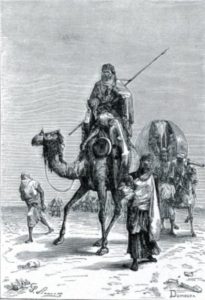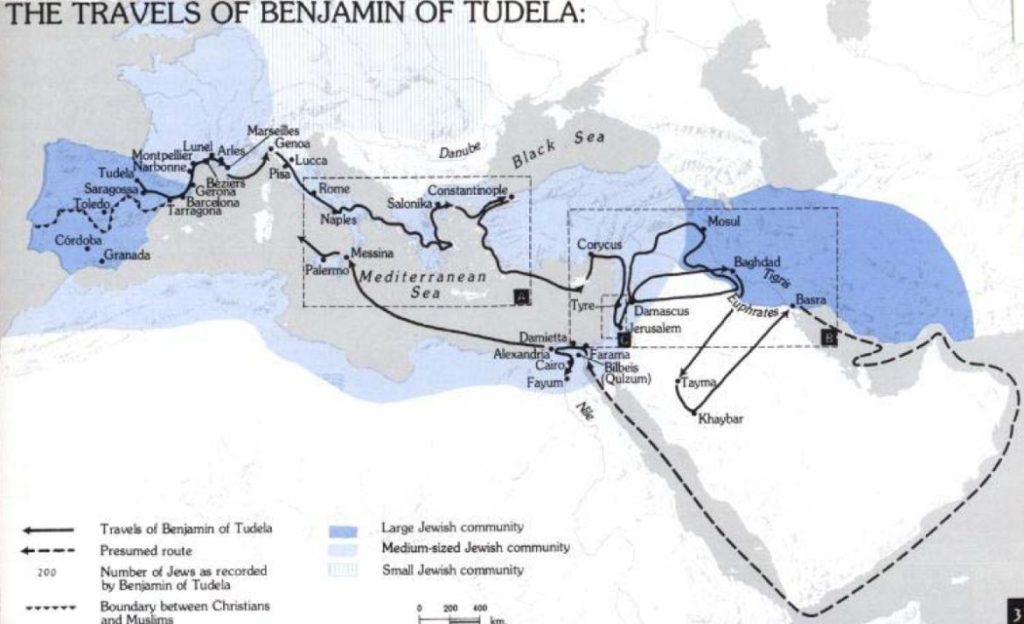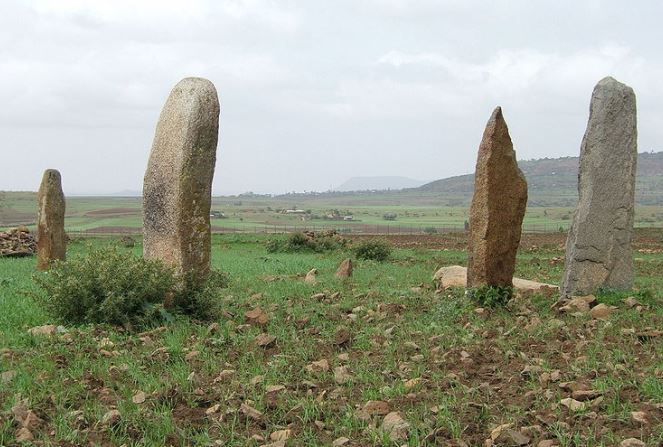The Jew Who Inspired Marco Polo

A 19th century engraving of ‘Benjamin of Tudela in the Sahara’
Binyamin MiTudela (1130-1173) was born to a religious Sephardic family in the town of Tudela, now in Spain. In 1165, he set out for what is believed to be a pilgrimage to Jerusalem. He had a larger objective in mind as well, since this was at the height of the Crusades and a perilous time for anyone to make a pilgrimage, especially Jews. Binyamin wanted to explore all the Jewish communities along the way and to create a detailed map showing the route one should take and where a Jew can find safe refuge on his journey. This would open the door for more Jews to take a trip to their beloved Holy Land. A lover of history and geography, he also wished to leave a record of what the Jewish (and non-Jewish) world looked like in the 12th century. Binyamin recorded all that he saw in his Sefer haMasa’at, “Book of Travels”, also known as Masa’aot Binyamin. His adventures were so popular they were soon translated into just about every European language. Today, the book is among the most important historical documents for scholars of the Middle Ages and the Renaissance, as well as of Jewish and Muslim history. A great deal of what we know about that era, including the daily lives of simple people, comes from his book. Some believe that it was this book that may have inspired another, more famous, adventurer about a century later: Marco Polo. Binyamin’s travels took him to France and the Italian Peninsula, then to Greece and across what is today Turkey to the Near East, then to Persia, back around the Arabian Peninsula, to Egypt, and returning to Iberia by way of North Africa. While in Ethiopia, he describes a large Jewish community, which was a key source of information allowing modern-day Ethiopian Jews to be accepted by the State of Israel and the rabbinate. He is possibly the first writer to detail the community of Al-Hashishin, better known as “Assassins”, as well as among the first to describe the Druze. In Posquières, he meets and describes the great Raavad. In Rome, he sees a Rabbi Yechiel, who is an advisor to the Pope, and has “free access to the Pope’s palace”! While in Baghdad, he writes of the Caliph, who is “like a Pope” for Muslims, and that the Caliph is fluent in Hebrew and knows Torah law extensively, though he rules with an iron fist. All in all, Benjamin of Tudela visited and wrote about some 300 cities. Today, there are streets named after him in Jerusalem and in Tudela, Spain, where there is also a high school bearing his name.
Words of the Week
One day I learned that dreams exist to come true, and since that day I do not sleep for rest. I sleep just to dream.
– Walt Disney


 Yehudit (c. 960 CE) was born in the Jewish-Ethiopian Kingdom of Beta Israel (also known as the Kingdom of Semien), the daughter of King Gideon IV, who traced his lineage back to King Solomon. According to tradition, the Ethiopian Beta Israel Jews are descendants of the Biblical Israelite tribe of Dan – a claim supported by historical texts from the 9th and 10th century that refer to an independent Jewish Danite kingdom in Africa. In the 900s CE, the Christian Ethiopian Kingdom of Axum began an aggressive expansion, and sought to forcibly convert all Jews and pagans. King Gideon was killed in battle, leaving the monarchy to his daughter Yehudit, or Gudit. Gudit formed an alliance with a neighbouring kingdom, and soon raised a massive confederation to defeat Axum. Axum’s capital was destroyed, and its churches and monuments burned down. Gudit saved the Jewish population from forced conversion. The community would survive until modern times, and most have now settled in Israel. Gudit went on to sit on the throne for 40 years, establishing a new dynasty that would last three centuries. Historical records suggest she laid down vast trade networks, and ruled over a wealthy kingdom. In one tradition, she is said to have married a Syrian-Jewish nobleman. The golden age she ushered in lasted until 1270, when a new Christian dynasty got the upper hand. The Jewish Beta Israel Kingdom would survive until 1627, when it was annexed and dissolved.
Yehudit (c. 960 CE) was born in the Jewish-Ethiopian Kingdom of Beta Israel (also known as the Kingdom of Semien), the daughter of King Gideon IV, who traced his lineage back to King Solomon. According to tradition, the Ethiopian Beta Israel Jews are descendants of the Biblical Israelite tribe of Dan – a claim supported by historical texts from the 9th and 10th century that refer to an independent Jewish Danite kingdom in Africa. In the 900s CE, the Christian Ethiopian Kingdom of Axum began an aggressive expansion, and sought to forcibly convert all Jews and pagans. King Gideon was killed in battle, leaving the monarchy to his daughter Yehudit, or Gudit. Gudit formed an alliance with a neighbouring kingdom, and soon raised a massive confederation to defeat Axum. Axum’s capital was destroyed, and its churches and monuments burned down. Gudit saved the Jewish population from forced conversion. The community would survive until modern times, and most have now settled in Israel. Gudit went on to sit on the throne for 40 years, establishing a new dynasty that would last three centuries. Historical records suggest she laid down vast trade networks, and ruled over a wealthy kingdom. In one tradition, she is said to have married a Syrian-Jewish nobleman. The golden age she ushered in lasted until 1270, when a new Christian dynasty got the upper hand. The Jewish Beta Israel Kingdom would survive until 1627, when it was annexed and dissolved.
 Pnina Tamano-Shata (b. 1981) was born in Wuzaba, Ethiopia, the granddaughter of a renowned Ethiopian rabbi. When she was three years old, her family fled Ethiopia due to civil war and famine. Israeli Hercules planes rescued her family in Sudan and brought them to Israel in a secret mission known as Operation Moses, which brought 8000 Ethiopian Jews back to their ancestral home. (Another 14,000 were brought in 1991 through Operation Solomon.) Tamano-Shata and her family spent several years in an immigrant facility before settling in Petah Tikva. From age 11, she worked to support her struggling family, and in high school was placed in the gifted program. After completing her military service, Tamano-Shata enrolled in law school. She was the president of the school’s Ethiopian Student Union, and was a noted social justice activist. After graduating, she became a reporter for Israel’s Channel 1. Five years later, she was covering a protest by Ethiopians in Israel and instead of reporting with the bias that her bosses asked for, joined the protesters herself. This inspired her to quit the media and enter politics. She joined the Yesh Atid party. When the party won a surprising 19 seats in the 2013 elections, Tamano-Shata became a Member of Knesset. This made her the first Ethiopian woman to hold a Knesset seat. She worked tirelessly for equality and affordable housing in Israel. Although she lost her seat in the 2015 elections, Tamano-Shata is still a vocal activist, role model, and an important leader for the 150,000 Ethiopian Jews in Israel.
Pnina Tamano-Shata (b. 1981) was born in Wuzaba, Ethiopia, the granddaughter of a renowned Ethiopian rabbi. When she was three years old, her family fled Ethiopia due to civil war and famine. Israeli Hercules planes rescued her family in Sudan and brought them to Israel in a secret mission known as Operation Moses, which brought 8000 Ethiopian Jews back to their ancestral home. (Another 14,000 were brought in 1991 through Operation Solomon.) Tamano-Shata and her family spent several years in an immigrant facility before settling in Petah Tikva. From age 11, she worked to support her struggling family, and in high school was placed in the gifted program. After completing her military service, Tamano-Shata enrolled in law school. She was the president of the school’s Ethiopian Student Union, and was a noted social justice activist. After graduating, she became a reporter for Israel’s Channel 1. Five years later, she was covering a protest by Ethiopians in Israel and instead of reporting with the bias that her bosses asked for, joined the protesters herself. This inspired her to quit the media and enter politics. She joined the Yesh Atid party. When the party won a surprising 19 seats in the 2013 elections, Tamano-Shata became a Member of Knesset. This made her the first Ethiopian woman to hold a Knesset seat. She worked tirelessly for equality and affordable housing in Israel. Although she lost her seat in the 2015 elections, Tamano-Shata is still a vocal activist, role model, and an important leader for the 150,000 Ethiopian Jews in Israel.